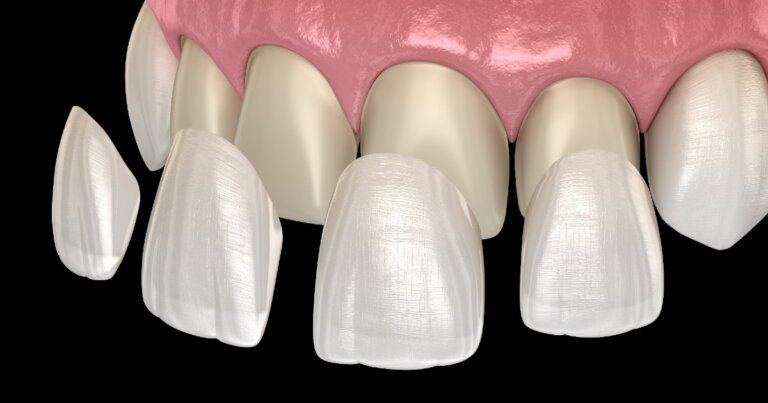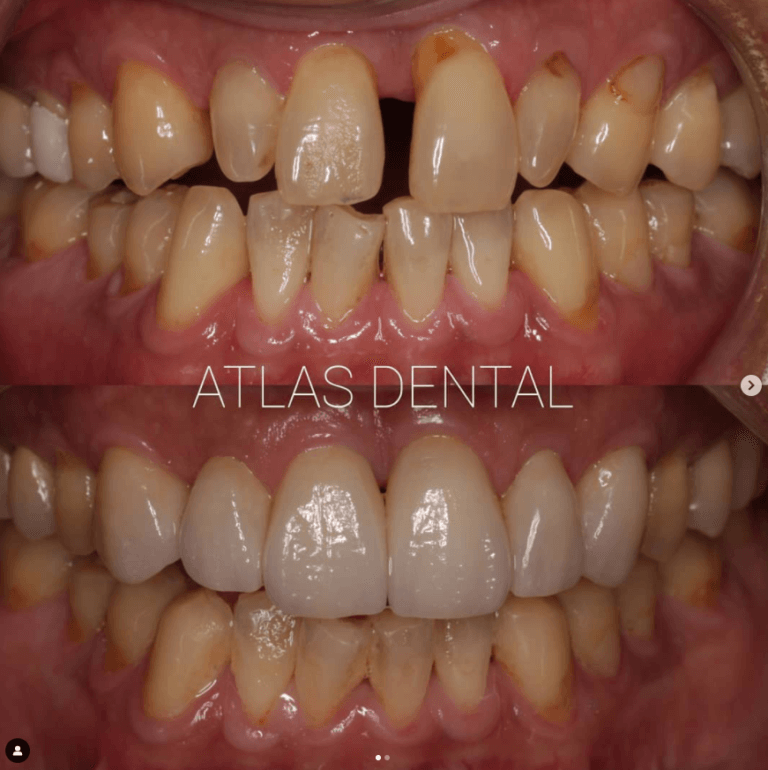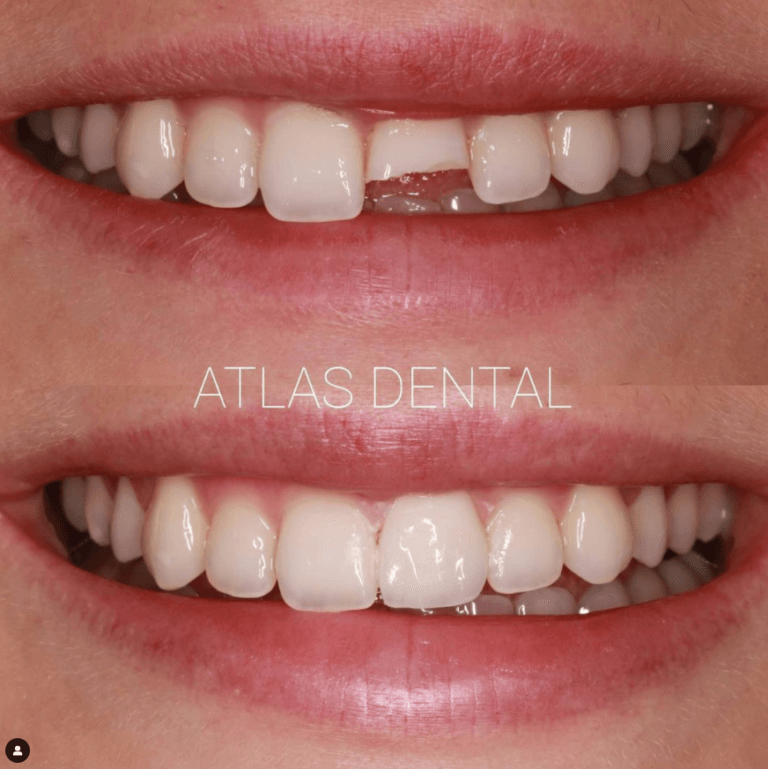Dental Veneers Recementation

What Is Dental Veneer Recementation?
Dental Veneers are thin, custom-made shells made from tooth-colored materials, like porcelain or composite resin, designed to cover the front surface of your teeth. Veneers offer a natural-looking enhancement to your smile, but they may sometimes need recementation due to wear, accidents, or other factors that cause the veneer to fall off. Veneer recementation is a common procedure where a dentist reattaches a veneer that has come loose, helping restore stability and safeguard your investment. Here’s what you should know:
- When is Dental Veneer Recementation Necessary?
- Benefits Of Dental Veneer Recementation
- Alternatives to Dental Veneer Recementation
- How Much Does Dental Veneer Recementation Cost?
- Steps In The Dental Veneer Recementation Procedure
- Frequently Asked Questions About Dental Veneer Recementation
If you have any further questions about Dental Veneer Recementation or other dental services offered at Atlas Dental, please contact us.

Free phone consultation
Have questions about porcelain veneers? Schedule a free phone consultation with our cosmetic smile dentist in Toronto.

Book In person Consultation
If you are ready to get started with your dental veneer smile treatment, book an in-person appointment now

Emergency Veneer Repair
Chipped a porcelain veneer or has a porcelain veneer fallen off? Schedule an emergency veneer repair online.
When is Dental Veneer Recementation Necessary?
Even though veneers are designed to last, they may loosen or dislodge for several reasons, requiring prompt recementation. Here are common scenarios where recementation may be needed:
- Normal Wear and Tear: Over time, the adhesive that holds veneers may weaken from regular chewing, grinding, or other habits, loosening the bond.
- Inadequate Bonding: Occasionally, initial bonding may not be as effective as intended, causing veneers to become loose unexpectedly.
- Tooth Decay: Decay or cavities in the tooth supporting the veneer can weaken its structure, compromising veneer stability.
- Accidental Trauma: Impacts from accidents or sports injuries can dislodge veneers, leaving the underlying tooth exposed to potential damage.
- Changes in Bite or Tooth Alignment: Significant shifts in tooth alignment or bite changes can create pressure on veneers, causing them to loosen.
Prompt attention to a loose veneer can help prevent further issues, such as discomfort, infection, or underlying tooth damage. Contact your dentist for an evaluation if you’re experiencing any of these conditions. If you have further questions about Dental Veneer Recementation, please contact us.

Benefits of Dental Veneer Recementation
Reattaching a loose veneer offers multiple benefits for both oral health and confidence. Here’s how:
- Preserves Tooth Structure: Recementation keeps the veneer securely in place, protecting the underlying tooth from decay and damage.
- Restores Functionality: Loose veneers can interfere with biting and chewing. Recementing the veneer restores normal function and comfort.
- Maintains Aesthetic Appeal: Veneers are crafted to match your natural teeth. Recementation helps keep your smile’s look seamless.
- Reduces Sensitivity: Exposed teeth can become sensitive. Recementation reduces discomfort by covering sensitive areas.
- Prevents Infection: Reattaching the veneer reduces bacteria buildup, lowering the risk of cavities or infections.
- Cost-Effective Solution: Prompt recementation can prevent the need for more extensive procedures.
- Boosts Confidence: A well-secured veneer lets you speak and smile confidently without concern for appearance.
Only a qualified dentist should perform veneer recementation; attempting to fix it at home can lead to complications. If you have further questions about Dental Veneer Recementation, please contact us.
Alternatives To Dental Veneer Recementation
If recementation isn’t an option, here are alternative treatments your dentist may recommend:
- Dental Veneer Remake: For damaged or poorly fitting veneers, a new custom veneer may be necessary.
- Dental Bonding: Composite bonding is more affordable and can address minor issues, but it lacks the durability of veneers.
- Dental Crowns: When there’s significant tooth damage, a dental crown may be better suited to protect and restore the tooth.
Your dentist will consider your oral health and veneer condition to determine the most appropriate course of action. If you have further questions about Dental Veneer Recementation, please contact us.
Cost of Recementation for Inlays/Onlays/Crowns/Veneers
The cost of a recementing an Inlay, Onlay, Crown or Veneer starts at $221 and up, depending on the amount of time it takes the dentist to perform this procedure. Normally, it takes 30 minutes, and would cost $221 for one. The codes relevant to dental crowns in the Ontario Dental Association’s Suggested Fee Guide appear as follows:
Recementation/Rebonding, Inlays/Onlays/Crowns/Veneers/Posts/Natural Tooth Gragments (single units only)
- 29102 – Two Unit of Time (30 minutes): $221
- 29103 – Three Unit of Time (45 minutes): $316
- 29104 – Four Unit of Time (60 minutes): $412
The recementation of single unit dental prostheses is usually considered a basic restorative procedure covered by your dental insurance. Be sure to find out from your dental insurance plan provider how much you are eligible for before going ahead with dental treatment. Your dentist can help you submit an predetermination to your dental insurance. Our fees are consistent with the ODA Fee Guide.
For patients without dental insurance, Atlas Dental is pleased to offer dental financing through iFinance Dentalcard. Affordable payment plans start at 7.95% for terms of 6 months to 6 years. To learn more about Dentalcard dental treatment financing, follow this link.
Steps in the Dental Veneer Recementation Procedure
Dental veneer recementation is straightforward but requires precision. Here are the steps:
- Evaluation: Your dentist examines the veneer and underlying tooth, sometimes using X-rays to ensure suitability for recementation.
- Cleaning and Preparation: The veneer and tooth are carefully cleaned to ensure a strong, lasting bond.
- Veneer Reattachment: Dental cement is applied, and the veneer is positioned back on the tooth.
- Bite Check and Adjustment: The dentist checks your bite to ensure comfort and alignment.
- Curing and Bonding: A curing light hardens the cement, securing the veneer in place.
- Final Polishing: The veneer is polished to blend seamlessly with your natural teeth.
- Aftercare Instructions: Your dentist may advise avoiding hard or sticky foods initially and maintaining good oral hygiene.
If you experience discomfort after the procedure, contact your dentist for adjustments. If you have further questions about Dental Veneer Recementation, please contact us.

Frequently Asked Questions About Dental Veneer Recementation
- What causes a dental veneer to become loose?
Veneers may loosen due to factors such as normal wear and tear, inadequate initial bonding, tooth decay, accidental trauma, or changes in bite or tooth alignment.
- Is recementation painful?
Patients usually experience minimal discomfort during recementation, as it is a straightforward procedure.
- How long does the recementation process take?
The procedure typically takes about 30 to 60 minutes, depending on the specific circumstances.
- How can I prevent my veneers from becoming loose again?
Maintain good oral hygiene, avoid biting on hard objects, and wear a mouthguard if you grind your teeth to help preserve the bond of your veneers.
- Can a veneer be recemented if it is damaged?
No, if the veneer is cracked or chipped, it will likely need to be replaced rather than recemented, as a damaged veneer cannot provide the necessary fit or aesthetics.
Dental veneer recementation is a reliable way to restore a loose or dislodged veneer, helping you regain your smile’s function and aesthetics. If you have further questions about Dental Veneer Recementation, please contact us.

